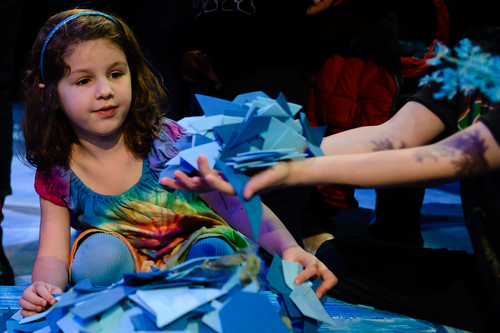There are many good reasons for children to be exposed to live theater: it teaches children empathy; it entertains them in a way that does not involve screens; it helps them develop an appreciation for the arts early in life; and it can help children develop a love of stories and reading.
And, according to Imagination Stage's Director of Education Joanne Seelig, live theater can also help children develop an appreciation for how art, science, math, literature, language arts, fine arts, world cultures and other subjects taught in school come together and can be applied in the real world. With so many benefits to live theater it's no wonder that attending children's theater is such a popular activity for families and a frequent choice for school field trips. But for many children a visit to the theater is not possible for financial reasons.
Believing that all children deserve a chance to experience the magic and the benefits of live theater Seelig and her colleagues implemented the Learning Through Theater program last year to bring all Montgomery County third graders in Title One schools, many of whom live in poverty to see a show. This year, 3,000 students were able to see 101 Dalmatians and later this year the program will expand to bring students in District of Columbia Title One schools to see Roald Dahl's The BFG at the National Theater.
To ensure students get the most they can out of the experience, the education department at Imagination Stage works closely with Montgomery County Public Schools and District of Columbia Public Schools to link the shows students will see to the schools' curriculum. Some classes get in-class visits from theater professionals before they visit the theater and some teachers receive professional development training before their class visits so that they incorporate lessons related to live theater into their classrooms throughout the year.
For each show that students will see, Imagination Stage creates a DVD for students to watch ahead of time that recreates the experience of a backstage tour so that students have an in-depth understanding of everything that goes into producing a show. Lessons touch on the science behind different types of lighting that will be use, architecture and the mathematical principles used in building the sets, and may even include lessons on heating and cooling in the theater. Before the show, students are given a lesson on actors' tools to gain a sense of how actors train for their parts and a member of the education department explains how different elements of scenery were built and how they will be used.
Teachers nearly universally find the program valuable and find that not only do students enjoy seeing their first live play but they come away from the experience with more ways to express themselves and a greater understanding of how what they learning in school can be used in real life. Seelig and her colleagues at Imagination Stage are passionate about the Learning Through Theater program and are hoping to use funds at this spring's Children's Ball on May 9th to deepen the program to include more teacher training and to eventually expand the program to other school districts in the DC metro area.
For many children, this may be their only opportunity to attend live theater. Some will undoubtedly walk away transformed by the experience.

